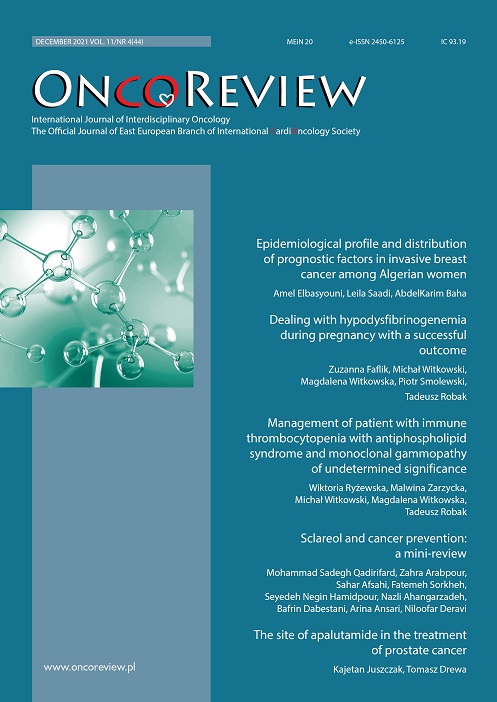Dealing with hypodysfibrinogenemia during pregnancy with a successful outcome Case report
Main Article Content
Abstract
Background: Fibrinogen is a protein playing pleiotropic role in human body. It is engaged in maintaining hemostasis. Congenital fibrinogen disorders comprise quantitative and qualitative fibrinogen anomalies. The symptoms range from bleeding, thrombosis to asymptomatic at all what is the most common case. Hypodysfibrinogenemia with lower level of fibrinogen of reduced activity, is the least common of all congenital fibrinogen disorders.
Case report: A 31-year-old woman was reported at the 21 weeks of gestation, suffered from genital tract bleeding and there was a history of stillbirth. Clinical examination with no pathology, however laboratory tests revealed coagulation abnormalities due to prolonged thrombin test, decreased protein S and lower fibrinogen level (70 mg/dl). Autoimmune diseases were excluded and the diagnosis was widened with rotational thromboelastometry and genetic test for hypodysfibrinogenemia. The patient was treated with fibrinogen substitution and prophylactic dose of heparin throughout pregnancy and 2 weeks following labour. At 39 week of gestation Caesarean section was done, with no complications.
Results: Genetic test revealed heterozygous mutation in fibrinogen gamma gene confirming hypodysfibrinogenemia. Due to bleeding manifestation in this patient of congenital fibrinogen disorders, fibrinogen substitution was implemented with heparin as a paranticoagulant prophylaxis, what turned out to be successful and enabled the patient to maintain the pregnancy.
Conclusions: As hypodysfibrinogenemia symptoms are diverse the management is difficult and each patient’s therapy should be planned separately. Pregnancy may be the first time when congenital fibrinogen disorders reveal and it is especially challenging to prevent from obstetrical complications.
Downloads
Metrics
Article Details

This work is licensed under a Creative Commons Attribution-NonCommercial 4.0 International License.
Copyright: © Medical Education sp. z o.o. This is an Open Access article distributed under the terms of the Attribution-NonCommercial 4.0 International (CC BY-NC 4.0). License (https://creativecommons.org/licenses/by-nc/4.0/), allowing third parties to copy and redistribute the material in any medium or format and to remix, transform, and build upon the material, provided the original work is properly cited and states its license.
Address reprint requests to: Medical Education, Marcin Kuźma (marcin.kuzma@mededu.pl)
References
2. Casini A, Neerman-Arbez M, Ariëns RA et al. Dysfibrinogenemia: From molecular anomalies to clinical manifestations and management. J Thromb Haemost. 2015; 13: 909-19. http://doi.org/10.1111/jth.12916.
3. John MJ, Byreddy P, Modak K et al. Congenital Fibrinogen Deficiency in India and Role of Human Fibrinogen Concentrate. Acta Haematol. 2021: 1-8. http://doi.org/10.1159/000516339.
4. Undas A, Casini A. Congenital structural and functional fibrinogen disorders: a primer for internists. 913-20. http://doi.org/10.20452/pamw.15082.
5. Casini A, Brungs T, Lavenu-Bombled C et al. Genetics, diagnosis and clinical features of congenital hypodysfibrinogenemia: a systematic literature review and report of a novel mutation. J. Thromb. Haemost. 2017; 15: 876-88. http://doi.org/10.1111/jth.13655.
6. Valiton V, Hugon-Rodin J, Fontana P et al. Obstetrical and postpartum complications in women with hereditary fibrinogen disorders: A systematic literature review. Haemophilia. 2019; 25: 747-54. http://doi.org/10.1111/hae.13825.
7. Zhou J, Xin L, Ding Q et al. Thromboelastography predicts risks of obstetric complication occurrence in (hypo)dysfibrinogenemia patients under non-pregnant state, Clin Exp Pharmacol. 2016; 43: 149-56. http://doi.org/10.1111/1440-1681.12509.
8. Ormesher L, Simcox L, Tower C et al. Management of inherited thrombophilia in pregnancy. Women’s Heal. 2016; 12: 433-41. http://doi.org/10.1177/1745505716653702.
9. Yan J, Deng D, Cheng P et al. Management of dysfibrinogenemia in pregnancy: A case report. J Clin Lab Anal. 2018; 32. http://doi.org/10.1002/jcla.22319.
10. Patil R, Mukaddam A, Ghosh K et al. Management of pregnancy in dysfibrinogenemia cases: A dilemma. Blood Coagul Fibrinolysis. 2017; 28: 91-3. http://doi.org/10.1097/MBC.0000000000000514.
11. Santoro R, Iannaccaro P, Sottilotta G. Congenital hypodysfibrinogenemia and abruptio placentae in a woman with history of cerebral thrombosis. Acta Obstet Gynecol Scand. 2007; 86: 247-8. http://doi.org/10.1080/00016340600608477.

